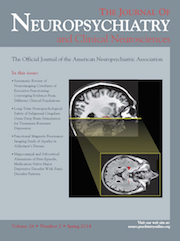To the Editor: Progressive supranuclear palsy (PSP) is a progressive neurodegenerative disease involving gradual deterioration and death of neurons and glial cells of the brain.
1 The principal areas of the brain affected are the basal ganglia, brainstem particularly the midbrain, cerebral cortex particularly frontal lobes, dentate nucleus of the cerebellum, and the spinal cord.
1 The cardinal manifestations include supranuclear ophthalmoplegia, parkinsonism, pseudobulbar palsy, and postural instability.
2 The neuropsychiatric symptoms of PSP include personality changes, depression, sleep disturbances, apathy, disinhibition, and cognitive impairment.
2 Literature has explored the association between PSP and cognitive impairment; however, the relationship of PPA with depression has been less investigated. We summarize a case of an elderly woman with PSP whose depression was successfully treated with ECT without deterioration in her neurologic symptoms.
Case Report
The patient is an 82-year-old woman who was admitted for increased depression, sense of hopelessness and worthlessness, social isolation, and decreased appetite. She was found to have nonfluent aphasia, dysarthria, paraphasia, scanning speech, some word finding difficulties, intact comprehension, mild extrapyramidal signs, mildly increased tone, mild bilateral rest and intention tremor, difficulty with downward gaze, narrow-based gait, and no focal weakness. Her mood was labile, which attributed to pseudobulbar palsy. She scored 24/30 on Mini-Mental State Examination. She has past history of depression since adulthood, which worsened after her diagnosis with PSP in 2011.
During admission, sertraline and escitalopram were tried but patient responded poorly. Given the severity of her depression and lack of response to antidepressants, ECT was considered. She received three treatments a week for a total of nine right unilateral ECT, which she tolerated adequately. She did not show confusion or worsening in her neurological symptoms. Objective and subjective improvement in her depressive symptoms was noted. Patient was started on Venlafaxine and discharged to an assisted living facility to continue treatment in a partial hospitalization program.
Discussion
The neuropsychiatric symptoms in PSP can be attributed to the associated neurobiological changes. These include dopamine depletion in the striatum, reduced dopamine type 2 receptors in the caudate nucleus and putamen, diminished choline acetyltransferase levels in the frontal cortex and basal ganglia, reduced serotonin receptors in the temporal lobe, and reduced GABAergic neurotransmitter systems in subcortical regions.
1Psychiatric symptoms in PSP patients are common.
3 Menza et al investigated 19 patients with PSP and found that 52% of the patients had dementia and 42% had other psychiatric diagnoses.
4 Depression is more likely to affect 20% of PSP patients within the next year of diagnosis.
3 However, there have been few reports of cases with depression as an antecedent symptom of PSP.
3 Kim et al suggested that depression can be the first symptom of developing PSP.
3 Esmonde et al studied the relationship between disease severity, cognitive impairment, and depression in 25 PSP patients.
5 They found that depression did not correlate with any other parameters.
5Seventy-seven percent of PSP patients display apathy without depression.
3 The differential diagnosis of apathy versus depression is challenging because the symptoms can overlap. Neurovegetative symptoms of depression (psychomotor retardation, loss of interest, sleep disturbances) are common in apathy.
6 Dysphoric symptoms (sadness, hopelessness, helplessness, guilt) help differentiate depression from apathy.
6 This differentiation is clinically relevant because apathy may not respond to treatment typically used to treat depression.
7Depression in PSP would respond to conventional antidepressants.
3 However, for patients with severe refractory depression, ECT might be considered. Studies have shown inconsistent responses of neurological symptoms in PSP patients treated with ECT. This is likely due to heterogeneous factors, including age, stage of illness, level of cognitive impairment, and comorbid medical illnesses.
8 Research has indicated that patients with basal ganglia lesions may have greater cognitive impairment with ECT; therefore, for PSP patients, unilateral electrode placement or twice-weekly treatment should be considered.
8
